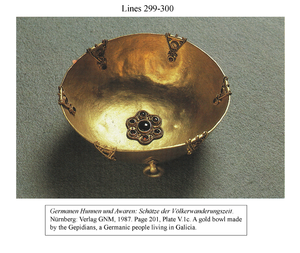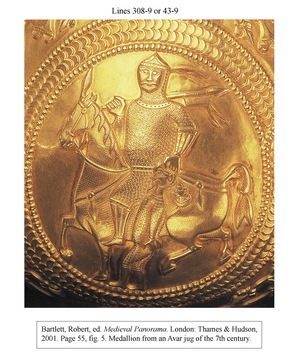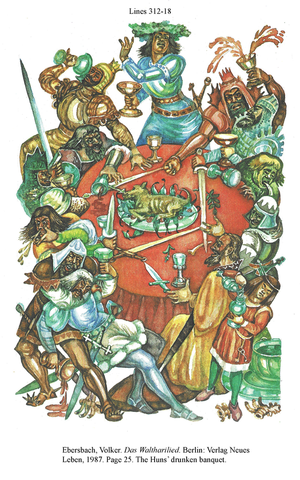Waltharius287
Walther hosts a luxurious banquet for Attila’s court; eventually all his intoxicated guests fall asleep (287–323)
| Virgo memor praecepta viri complevit. et ecce | DSDSDS | |||||
| Praefinita dies epularum venit, et ipse | Aeneid 1.637-642; 1.697-708; 8.175-183. Prudentius, Apotheosis 712-713. Liber Hester chapter 1.
|
SDDSDS | ||||
| Waltharius magnis instruxit sumptibus escas. | Aeneid 1.637-642; 1.697-708; 8.175-183. Prudentius, Apotheosis 712-713. Liber Hester chapter 1.
|
DSSSDS | ||||
| Luxuria in media residebat denique mensa, | 290 | Luxuria: personified
|
Aeneid 1.637-642; 1.697-708; 8.175-183. Prudentius, Apotheosis 712-713. Liber Hester chapter 1.
|
DDDSDS Elision: luxuria in |
||
| Ingrediturque aulam velis rex undique septam. | Septam equiv. to saeptam, here “hung with” tapestries (velis), although a certain double-entendre in reference to the trap that is about to “enclose” Attila and his court may be intended.
|
Aeneid 1.637-642; 1.697-708; 8.175-183. Prudentius, Apotheosis 712-713. Liber Hester chapter 1.
|
DSSSDS Elision: ingrediturque aulam |
|||
| Heros magnanimus solito quem more salutans | Aeneid 1.637-642; 1.697-708; 8.175-183. Prudentius, Apotheosis 712-713. Liber Hester chapter 1.
|
SDDSDS | ||||
| Duxerat ad solium, quod bissus compsit et ostrum. | Bissus: “fine linen”
|
Aeneid 1.637-642; 1.697-708; 8.175-183. Prudentius, Apotheosis 712-713. Liber Hester chapter 1.
|
DDSSDS | |||
| Consedit laterique duces hinc indeque binos | Aeneid 1.637-642; 1.697-708; 8.175-183. Prudentius, Apotheosis 712-713. Liber Hester chapter 1.
|
SDDSDS | ||||
| Assedisse iubet; reliquos locat ipse minister. | 295 | Aeneid 1.637-642; 1.697-708; 8.175-183. Prudentius, Apotheosis 712-713. Liber Hester chapter 1.
|
SDDDDS | |||
| Centenos simul accubitus iniere sodales, | Centenos equiv. to centum Accubitus: the word implies the ancient practice of reclining on couches while eating, but the poet probably simply means “seat.”
|
Aeneid 1.637-642; 1.697-708; 8.175-183. Prudentius, Apotheosis 712-713. Liber Hester chapter 1.
|
SDDDDS | |||
| Diversasque dapes libans conviva resudat. | Resudat: The parallel in Prudentius suggests that this “sweating out” is a sign of over-indulgence, not pleasure. Singular for plural.
|
Aeneid 1.637-642; 1.697-708; 8.175-183. Prudentius, Apotheosis 712-713. Liber Hester chapter 1.
|
SDSSDS | |||
| His et sublatis aliae referuntur edendae, | Aeneid 1.637-642; 1.697-708; 8.175-183. Prudentius, Apotheosis 712-713. Liber Hester chapter 1.
|
SSDDDS | ||||
| Atque exquisitum fervebat migma per aurum | Migma: “mixture,” probably some sort of warm drink, e.g. mulled wine (not mead, as this was drunk cold).
|
Aeneid 1.637-642; 1.697-708; 8.175-183. Prudentius, Apotheosis 712-713. Liber Hester chapter 1.
|
SSSSDS Elision: atque exquisitum |
|||
| Aurea bissina tantum stant gausape vasa -- | 300 | Bissina…gausape: “linen tablecloth.” The noun is not feminine in Classical authors.
|
Aeneid 1.637-642; 1.697-708; 8.175-183. Prudentius, Apotheosis 712-713. Liber Hester chapter 1.
|
DSSSDS | ||
| Et pigmentatus crateres Bachus adornat. | Pigmentatus…Bachus: usually interpreted as “spiced wine;” German wine of the period was sour and had to be sweetened or flavored. But a miniature ecphrasic description of the appearance of the painted crateres (“mixing bowls,” here perhaps “cups”) also seems possible, given the emphasis on the material and visual (aurea, bissina, adornat, species) in this context.
|
Aeneid 1.637-642; 1.697-708; 8.175-183. Prudentius, Apotheosis 712-713. Liber Hester chapter 1.
|
SSSSDS | |||
| Illicit ad haustum species dulcedoque potus. | Aeneid 1.637-642; 1.697-708; 8.175-183. Prudentius, Apotheosis 712-713. Liber Hester chapter 1.
|
DSDSDS | ||||
| Waltharius cunctos ad vinum hortatur et escam. | Aeneid 1.637-642; 1.697-708; 8.175-183. Prudentius, Apotheosis 712-713. Liber Hester chapter 1.
|
DSSSDS Elision: vinum hortatur |
||||
| Postquam epulis depulsa fames sublataque mensa, | Sublata mensa: once again it is unclear whether this is merely figurative language for “at the end of the meal,” picking up Virgil’s mensae remotae, or whether the poet envisions the tables being carried out. Althof emphasizes that the use of the singular does not establish that the guests necessarily feasted at one common table.
|
Aeneid 1.637-642; 1.697-708; 8.175-183. Prudentius, Apotheosis 712-713. Liber Hester chapter 1.
|
DSDSDS Elision: postquam epulis |
|||
| Heros iam dictus dominum laetanter adorsus | 305 | Iam dictus: “the aforementioned,” i.e., Waltharius, a metrical crutch.
|
Aeneid 1.637-642; 1.697-708; 8.175-183. Prudentius, Apotheosis 712-713. Liber Hester chapter 1.
|
SSDSDS | ||
| Inquit: 'in hoc, rogito, clarescat gratia vestra, | Aeneid 1.637-642; 1.697-708; 8.175-183. Prudentius, Apotheosis 712-713. Liber Hester chapter 1.
|
DDSSDS | ||||
| Ut vos inprimis, reliquos tunc laetificetis.' | Aeneid 1.637-642; 1.697-708; 8.175-183. Prudentius, Apotheosis 712-713. Liber Hester chapter 1.
|
SSDSDS | ||||
| Et simul in verbo nappam dedit arte peractam | Nappam equiv. to poculum, cf. German Napf.
|
Aeneid 1.637-642; 1.697-708; 8.175-183. Prudentius, Apotheosis 712-713. Liber Hester chapter 1.
|
DSSDDS | |||
| Ordine sculpturae referentem gesta priorum, | Aeneid 1.637-642; 1.697-708; 8.175-183. Prudentius, Apotheosis 712-713. Liber Hester chapter 1.
|
DSDSDS | ||||
| Quam rex accipiens haustu vacuaverat uno, | 310 | Aeneid 1.637-642; 1.697-708; 8.175-183. Prudentius, Apotheosis 712-713. Liber Hester chapter 1.
|
SDSDDS | |||
| Confestimque iubet reliquos imitarier omnes. | Aeneid 1.637-642; 1.697-708; 8.175-183. Prudentius, Apotheosis 712-713. Liber Hester chapter 1.
|
SDDDDS | ||||
| Ocius accurrunt pincernae moxque recurrunt, | Pincernae: “cup-bearers,” among the Germans usually noble youths.
|
Aeneid 1.637-642; 1.697-708; 8.175-183. Prudentius, Apotheosis 712-713. Liber Hester chapter 1.
|
DSSSDS | |||
| Pocula plena dabant et inania suscipiebant. | Aeneid 1.637-642; 1.697-708; 8.175-183. Prudentius, Apotheosis 712-713. Liber Hester chapter 1.
|
DDDDDS | ||||
| Hospitis ac regis certant hortatibus omnes. | Hospitis: i.e., Waltharius, the host of the banquet.
|
Aeneid 1.637-642; 1.697-708; 8.175-183. Prudentius, Apotheosis 712-713. Liber Hester chapter 1.
|
DSSSDS | |||
| Ebrietas fervens tota dominatur in aula, | 315 | Aeneid 1.637-642; 1.697-708; 8.175-183. Prudentius, Apotheosis 712-713. Liber Hester chapter 1.
|
DSSDDS | |||
| Balbutit madido facundia fusa palato, | Aeneid 1.637-642; 1.697-708; 8.175-183. Prudentius, Apotheosis 712-713. Liber Hester chapter 1.
|
SDSDDS | ||||
| Heroas validos plantis titubare videres. | Aeneid 1.637-642; 1.697-708; 8.175-183. Prudentius, Apotheosis 712-713. Liber Hester chapter 1.
|
SDSDDS | ||||
| Taliter in seram produxit bachica noctem | Produxit bachica…munera: “prolonged the drinking”
|
Aeneid 1.637-642; 1.697-708; 8.175-183. Prudentius, Apotheosis 712-713. Liber Hester chapter 1.
|
DSSSDS | |||
| Munera Waltharius retrahitque redire volentes, | Aeneid 1.637-642; 1.697-708; 8.175-183. Prudentius, Apotheosis 712-713. Liber Hester chapter 1.
|
DDDDDS | ||||
| Donec vi potus pressi somnoque gravati | 320 | Aeneid 1.637-642; 1.697-708; 8.175-183. Prudentius, Apotheosis 712-713. Liber Hester chapter 1.
|
SSSSDS | |||
| Passim porticibus sternuntur humotenus omnes. | Aeneid 1.637-642; 1.697-708; 8.175-183. Prudentius, Apotheosis 712-713. Liber Hester chapter 1.
|
SDSDDS | ||||
| Et licet ignicremis vellet dare moenia flammis, | Licet…remansit equiv. to etiamsi voluisset dare…nullus remansisset Ignicremis equiv. to igne cremantibus – a rare word, but not coined by this poet.
|
Aeneid 1.637-642; 1.697-708; 8.175-183. Prudentius, Apotheosis 712-713. Liber Hester chapter 1.
|
DDSDDS | |||
| Nullus, qui causam potuisset scire, remansit. | Causam equiv. to rem (cf. line 325 below and note on line 147).
|
SSDSDS |
| « previous |
|
next » | English |


